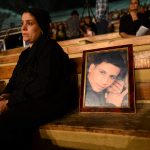Syrian Christians Seek Stability, Equal Citizenship
By Shahyan Tahseen — Rudaw Interview
Patriarch Ignatius Aphrem II, head of the Syriac Orthodox Church, says Syria’s Christian community continues to shrink amid instability, migration, and lack of political inclusion. Despite hopes tied to the new government, he warns that uncertainty, weak state control, and discriminatory laws still threaten the future of Christians in their ancestral homeland.
“Christians Are Part of Syria’s Fabric”
“Christians are certainly part of the Syrian community, so the general situation of Syrians is also the situation of Christians,” Aphrem said. He lamented that many have migrated because of insecurity and the unclear future of the country. “There is no complete control over the situation in Syria. This is scary for everyone.”
He stressed that Christians supported the political transition that brought President Ahmed al-Sharra’s government to power, seeking peace and stability. Yet, “their situation has not changed for the better until now,” he said. “They are the original inhabitants of Syria … but what we expect now is that Christians will be treated like first-class citizens.”
Political Marginalization and Shrinking Representation
Aphrem expressed disappointment at the results of recent parliamentary elections, where only two Christians were elected. “This worries us. We want Christians to be equal in all their rights and duties. It is our duty to serve our country, but we want to be given the opportunity to do so,” he said.
The Church had encouraged participation, and the government also urged Christians to vote, yet turnout was low. “We don’t doubt the election results, but there was a lack of participation,” he said. Many Syrians saw the vote as their first chance to engage politically after decades of repression, but minorities “were not given the opportunity to play a major role.”
Meeting President Sharra
Aphrem met with President Ahmed al-Sharra in May and described the meeting as “constructive and positive.” He received “reassurances about the future of Syria as a community for all citizens,” yet acknowledged that the government faces limits.
“Regional and foreign interventions, and differences among groups within the government, make implementation difficult,” he said. Still, he added, “I personally do not doubt the government’s intention.”
Equal Citizenship, Not Special Privileges
The patriarch emphasized that Syrian Christians do not seek international protection or special privileges. “We are against giving any privileges to Christians. But we want Christians to be citizens of the first degree — with full rights and responsibilities,” he said, adding that this was also the president’s promise.
However, emigration continues to deplete the community. “In my opinion, the number does not exceed 500,000 Christians in Syria, down from more than 1.5 million ten years ago,” he said. Most belong to Orthodox traditions and are spread across Damascus, Aleppo, Homs, Qamishli, Hasakah, Latakia, and Tartous. “They have lived on their lands for thousands of years,” he added.
On the New Constitution
Asked about Syria’s proposed new constitution, Aphrem said the current “constitutional declaration” fails to reflect the aspirations of all Syrians. “Especially the clause stating that Islamic jurisprudence is the only source of legislation — this must change,” he said. “We know Syria is a Muslim-majority country, but all citizens — Muslims, Christians, or non-Muslims — must have full rights.”
He urged for a more civil framework and equal representation. “Many powers are still concentrated in the presidency. We hope the new constitution will guarantee equality, participation, and shared nation-building,” he said.
A Cautious Optimism
“I am optimistic, but I am careful,” Aphrem said. “The situation is still unstable, the vision unclear. Many Syrians depend on help from neighboring countries, but such help must not come at the expense of the Syrian people.” He reiterated opposition to foreign interference and expressed hope that reforms would proceed peacefully.
Inter-Communal Relations and Violence
On renewed violence in Suwayda, Aleppo, and Kurdish regions, Aphrem condemned all use of force. “We are against violence by anyone, against anyone. All Syrians are our holy blood,” he said. “As Christians, we are peaceful people. We do not pose a threat to any party. We want to cooperate with the authorities — this is our duty as Christians.”
He expressed hope that Syria’s diverse communities could coexist peacefully. “Every cultural identity must be respected within a unified Syrian state,” he said. “Diversity is a richness for Syria, not a threat.”
Tensions with the Kurdish Self-Administration
Aphrem acknowledged problems between the Syriac Orthodox Church and the Kurdish-led autonomous administration in northeastern Syria, particularly over education. “Our schools are closed because we rejected the curriculum imposed by the self-administration,” he said. “We insist on using the official Damascus curriculum, since our students continue to Syrian universities.”
Church leaders in Hasakah are in dialogue with the Kurdish authorities, but “no solution has yet been reached.” Aphrem said he has not personally met with Mazloum Abdi or other Kurdish officials, though he would welcome such contact. “We want good relations with all parties, but within the national framework of Syria,” he said.
The patriarch recalled his childhood in Qamishli, where Syriacs and Kurds lived side by side. “I had Kurdish friends, and we spoke each other’s languages,” he said with a smile. “Every language is a gain and a blessing. My childhood in Qamishli taught me that coexistence is possible.”
A Message to the World
Despite his cautious optimism, Aphrem’s overarching message is one of endurance and belonging. “Christians are not strangers in Syria,” he said. “We are its first inhabitants, and our only request is to live as equal citizens — with dignity, safety, and full participation in our country’s future.”
___________
Abbreviated from: http://www.aina.org/news/20251008165926.htm





